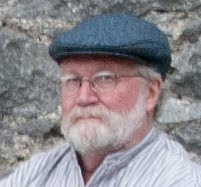 Brendan Parsons, Seventh Earl of Rosse, photographed in the Birr Castle archives room by Sherwood Harrington, August, 2006
Brendan Parsons, Seventh Earl of Rosse, photographed in the Birr Castle archives room by Sherwood Harrington, August, 2006In a comment on the entry "Cloudy Skies, Clear Genius..." ronniecat asks:
Is the current Lord Rosse as interesting and unusual as his predecessors?
Brendan Parsons, the Seventh Earl of Rosse, is a remarkable man in his own right (just take a look at this article from 2005 about his honorary doctorate from Trinity College, Dublin.) He is also a very charming man in person, and Diane and I are honored to have had the delightful experience of conversing with him and his wife, Alison, Countess of Rosse, in their home. (The current Lady Rosse is an accomplished artist -- see #s 45 and 46 in this index of works displayed in the current display at the Jorgensen Fine Art Gallery, Dublin, "A Century of Women Artists." But, of course, they are all accomplished at something or another to a degree that makes ordinary folks like me feel pretty mundane.)
 Diane chats with Lord Rosse in the gathering evening twilight as he tends a bush by the banks of the Camcor on the Tipperary side of his Demesne.
Diane chats with Lord Rosse in the gathering evening twilight as he tends a bush by the banks of the Camcor on the Tipperary side of his Demesne. His identity internally seems to be completely Irish, as befits someone whose ancestors going back seven generations have occupied the same house in the Irish midlands. I say this because for some the title "Earl" or "Lord" -- originating as they do in England -- seems superficially to token an English identity.
Some insights into Lord Rosse's thinking can be found in numerous quotes from him in Anne Chambers's 2000 book, _At Arm's Length: Aristocrats in the Republic of Ireland_. Here are just three: [Double quotes denote Chambers, single ones denote Lord Rosse]
[On his family's multi-generational eschewing of upper-class English schooling] "[He] maintains that if his ancestors had not bypassed the established route of an English public ["private" in American usage] school for an education at home, 'they would never have become famous scientists. They would have been turned into these sort of petty-minded bureaucrats who might have made good civil servants, but who would not have a flair for anything mathematical or scientific or any feeling of a wider world beyond the British Empire.'"
[Concerning the political future of the island] "Brendan Parsons feels strongly 'that we should and must be one country. It will be a gradual process but it will be a process of gradual elimination when the border will count less and less. It costs three billion pounds per year just to keep six counties of Irland half-British. They will soon be discarded by Britain who will get bored for paying for all that.'"
And, most poignantly, this concerning famine then and now:
"At Birr Castle today, the memory of the Famine has remained indelibly etched in the psyche of following generations of the Parsons family. The present-day Earl of Rosse has in more recent times had first-hand experience of the ravages of famine. For fifteen years he served with the UN as relief co-ordinator during the disasters in Bangladesh and the Sudan. The fact that his ancestor during the course of the Great Famine chose 'to employ the people creatively, earning a wage instead of enduring the ignominy of the soup kitchen,' is something that he himself endeavoured to put into practice during his tenure with the UN relief agency. During the Famine over five hundred people were employed on the estate at Birr, building everything from walls to bridges. 'I've now got over five and a half kilometres of wall and twenty-three bridges to keep up, thanks to all that,' Brendan Parsons muses ruefully.
 A famine-relief work that the Parsons are still paying for: a "guardhouse," and a bridge over a moat that were built by townspeople during the Great Famine.
A famine-relief work that the Parsons are still paying for: a "guardhouse," and a bridge over a moat that were built by townspeople during the Great Famine."He contrasts this with the attitude of some British agencies that come in and 'tend to try and impose their solutions and economic theories which don't work on the ground. You must identify with the problems of the people actually starving, give them a respect by adhering to their traditions and not try to turn them into something they are not.'"
Ronniecat, this man is a force. Yes, indeed, he is as interesting and unusual as his predecessors, and I wish the world had more like him.
However, since this blog seems to be running the risk of becoming a pean to the Parsons, I'm going to give them a rest for a while. Oh, right after I reply to Brian's comment real soon now.
(More of our pictures of the Birr Castle Demesne can be seen in this slideshow.)


No comments:
Post a Comment